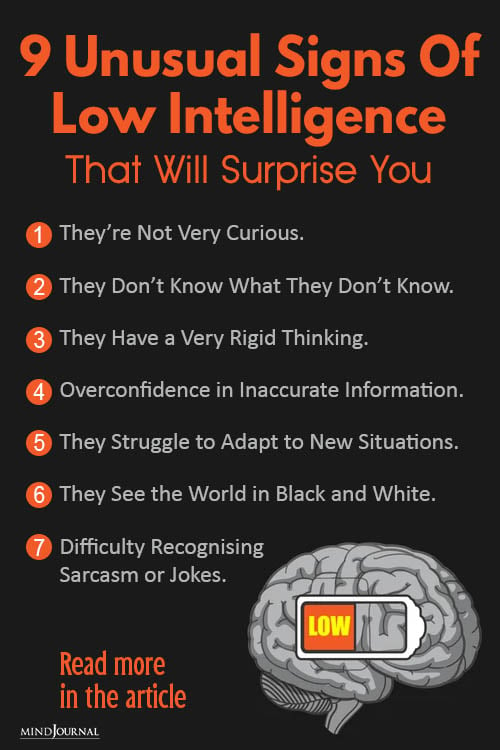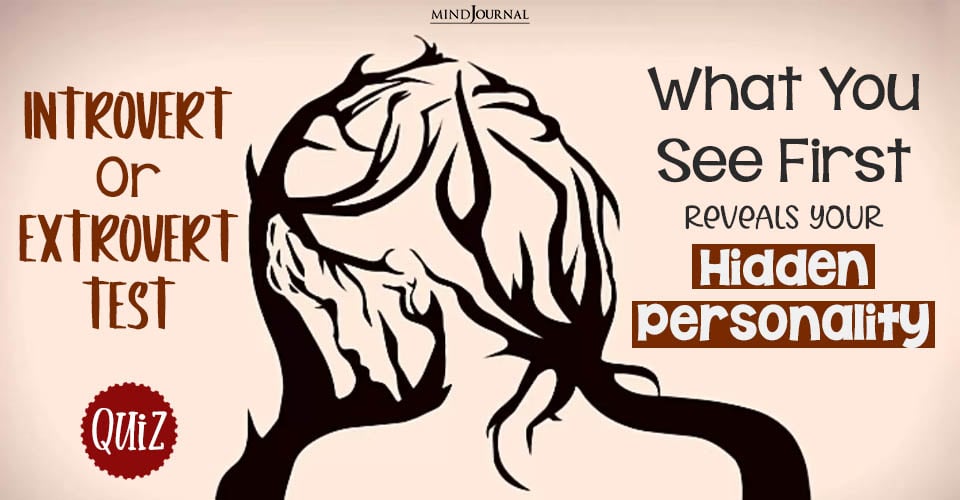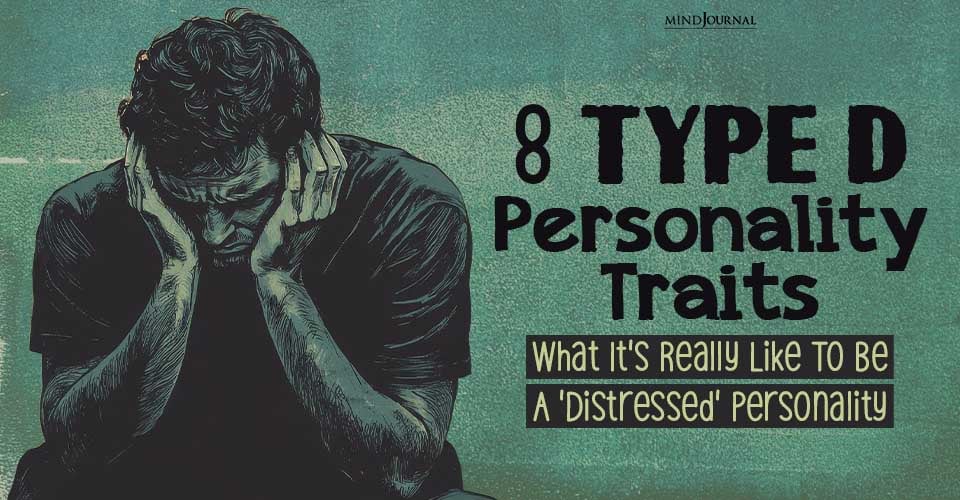When we talk about intelligence, most of us picture sharp-witted people solving puzzles or doing complex math. But the signs of low intelligence can be just as telling, and they show up in ways you might not expect.
A low IQ person often exhibit certain behaviors or attitudes that make them stand out. Whether it’s their inability to adapt or their rigid thinking, these subtle low IQ symptoms say a lot.
Today, we are going to do a deep dive into the 9 unusual signs of low intelligence that might surprise you—because intelligence isn’t just about getting straight A’s.
Related: 4 Quadrants Of Emotional Intelligence And What They Mean
9 Signs Of Low Intelligence
1. They’re Not Very Curious.
Ever met someone who just isn’t interested in learning new things? Curiosity is a key trait of intelligent people because it shows a willingness to explore and understand the world.
On the flip side, a lack of curiosity often points to low intelligence. These people are content with what they know and rarely ask questions.
They don’t feel the need to expand their knowledge or challenge their thinking, staying within the comfort zone of what they already understand. Their conversations are often surface-level, never diving deep into new or complex topics.
2. They Don’t Know What They Don’t Know.
This one’s a bit tricky. A low IQ person tends to be unaware of their own ignorance. They assume they know enough and don’t realize how much more there is to learn. It’s like they live in a bubble, unaware of the gaps in their knowledge.
When confronted with something outside their expertise, instead of admitting they don’t know, they might pretend or try to bluff their way through it. It’s not just that they don’t know things; it’s that they don’t even recognize the limits of their own knowledge.
3. They Have a Very Rigid Thinking.
One of the biggest signs of low emotional intelligence is this. Flexibility in thought is a sign of intelligence, while rigidity is one of the biggest signs of low intelligence. People with low intelligence often stick to their beliefs, even when presented with evidence that contradicts them.
They struggle to see things from different perspectives and have a hard time changing their minds. This rigid thinking means they’re not open to new ideas or approaches, which can make them frustrating to deal with.
A low IQ person prefers sticking to what they know, even if it’s wrong or outdated, because change makes them uncomfortable.

4. Overconfidence in Inaccurate Information.
Have you ever met someone who speaks with absolute certainty about something they clearly have wrong? That overconfidence is often one of the major signs of low IQ.
These people don’t take the time to verify their facts, yet they’ll argue about them with complete confidence. It’s not just that they get things wrong—they refuse to consider that they might be wrong in the first place.
This overconfidence can make them appear arrogant or stubborn, even when they’re clearly off the mark.
5. They Struggle to Adapt to New Situations.
Adapting to change is crucial in a fast-paced world, but people with low intelligence often struggle with this. They find it difficult to adjust when things don’t go according to plan or when they’re in unfamiliar situations.
Whether it’s learning a new skill or navigating a change at work, they’ll often resist or avoid it altogether. Instead of being open-minded and embracing new opportunities, they rigidly cling to their routines and familiar patterns, which ends up limiting their growth.
This inability to adapt makes them less likely to succeed in environments that require them to be flexible and innovative.
Related: How To Strengthen Your Intuition? Unlocking Your Inner Guidance With 8 Actionable Inputs
6. They See the World in Black and White.
One of the obvious signs of low intelligence is black and white thinking. There’s no room for nuance or gray areas in their thinking. A low IQ person tends to see things as either good or bad, right or wrong, with little consideration for the complexities of life.
This sort of simplistic worldview stops them from understanding different perspectives, and makes them really judgemental, or in other words, they are very quick to judge.
They struggle with ambiguity and prefer everything to be straightforward, even though most of life exists in shades of gray.
7. Difficulty Recognising Sarcasm or Jokes.
One of the most unusual low IQ symptoms is the inability to understand sarcasm and jokes. Sarcasm and humor often rely on subtle cues and quick thinking, so it’s no surprise that people with low intelligence may struggle in this area.
They might take jokes literally or miss the punchline altogether. This can make social interactions awkward, as they don’t fully grasp what’s being said.
Humor, especially sarcastic humor, requires a level of mental agility and understanding of context that they often lack. Instead of laughing along, they’re left puzzled or offended, missing the playfulness of the conversation.
8. They Lack Empathy.
Empathy requires an understanding of emotions and the ability to put yourself in someone else’s shoes. People with low IQ symptoms often struggle with this. They may not pick up on emotional cues or understand the feelings of others.
This lack of empathy can make them come across as cold or indifferent. It’s not that they don’t care—they simply don’t have the mental tools to connect with others on a deeper emotional level.
This can make forming deep, meaningful relationships difficult, as they seem out of touch with the emotions around them.
9. They’re Self-Centered.
Being self-centered is another common signs of low intelligence and also one of the signs of low emotional intelligence. They tend to focus on themselves and their needs, with little regard for others. Whether it’s in conversation or actions, everything revolves around them.
They struggle to see things from another person’s perspective and often expect others to cater to their wants and desires.
This self-centeredness can make them seem selfish or entitled, as they lack the emotional intelligence needed to consider the feelings or needs of those around them.
Related: 10 Unexpected Traits Of Intelligent People
Okay! Now that we know the signs of low intelligence, let’s talk about how to deal with a low IQ person.
How To Deal With A Low IQ Person?
1. Be Patient and Clear.
When interacting with someone who struggles with complex thinking or decision-making, it’s important to be more patient than usual. Break down information into simple, clear steps to avoid overwhelming them.
Avoid using jargon or complex terms, and be ready to explain things multiple times if needed. Patience will help create a more understanding and cooperative atmosphere.
2. Encourage Step-by-Step Learning.
How to deal with a low IQ person? Instead of expecting instant understanding, guide them through tasks or ideas step by step.
Helping them learn through small, manageable chunks can improve their understanding without frustration. This strategy works well when teaching new skills or handling unfamiliar situations.
3. Avoid Sarcasm or Complicated Humor.
A low IQ person may struggle with understanding sarcasm or subtle humor. Stick to straightforward language and avoid jokes that might confuse them.
Clear communication helps them feel included and can prevent misunderstandings in social situations.
4. Acknowledge Their Strengths
While they may struggle in certain areas, it’s important to recognize and highlight what they do well.
Compliment their strengths, whether it’s in practical tasks, creativity, or other skills. Focusing on their positive traits builds confidence and strengthens your relationship.
5. Offer Emotional Support and Empathy
People with lower intelligence often struggle with emotional cues, but this doesn’t mean they don’t experience feelings. Offering empathy and support when they’re frustrated or confused can make a big difference.
Validate their emotions and provide reassurance, creating a safe space for open communication.
Related: 6 Characteristics Of Highly Intelligent People According To Science
Bottomline
Low intelligence isn’t always about academic performance—it can show up in everyday behaviors and attitudes too. These 9 signs are subtle but telling, revealing more about how someone navigates the world than you might think.











Leave a Reply